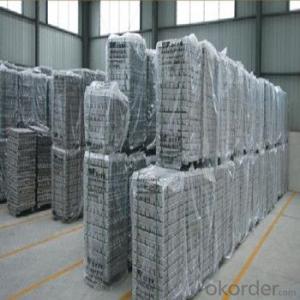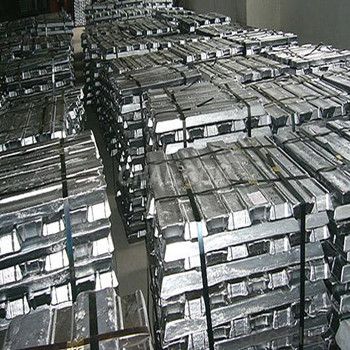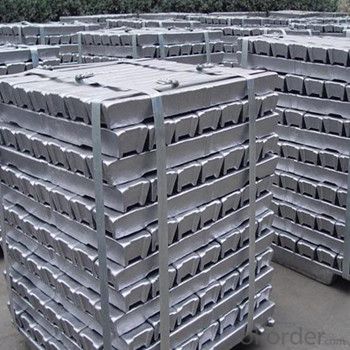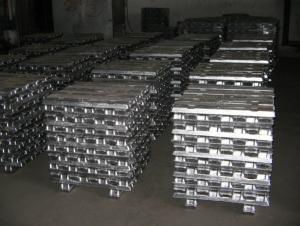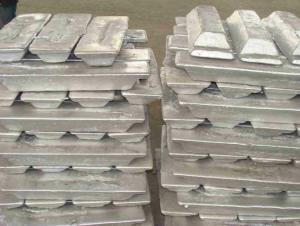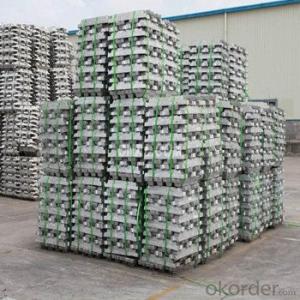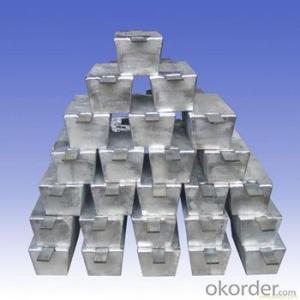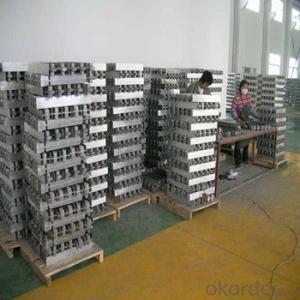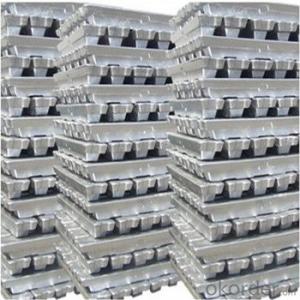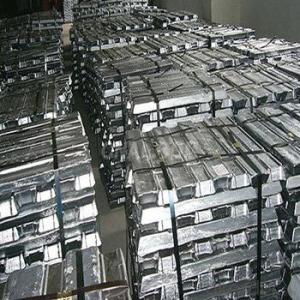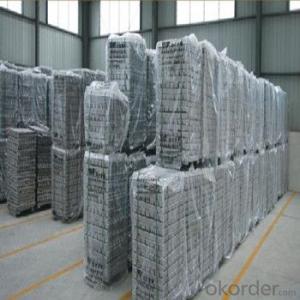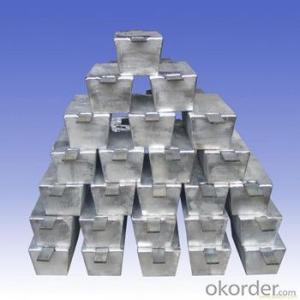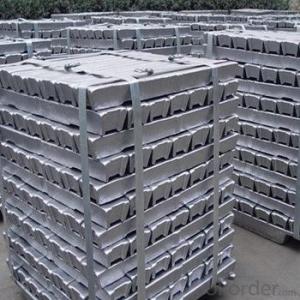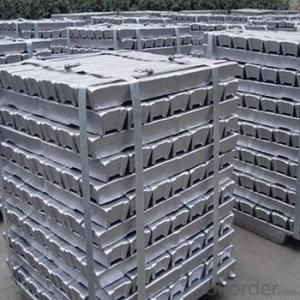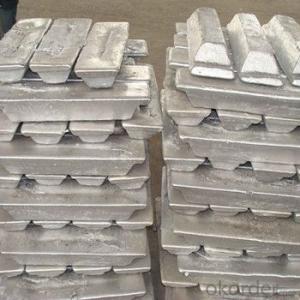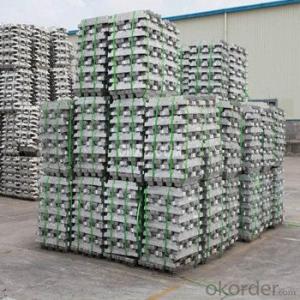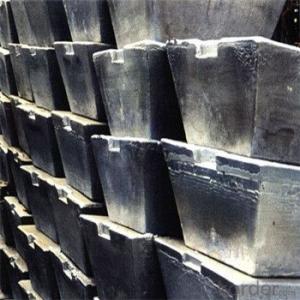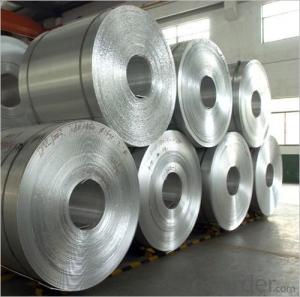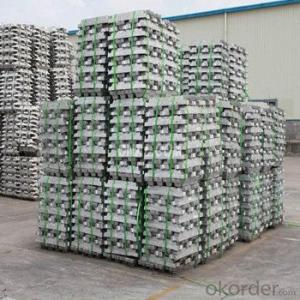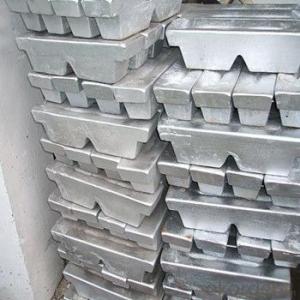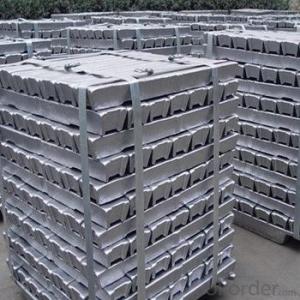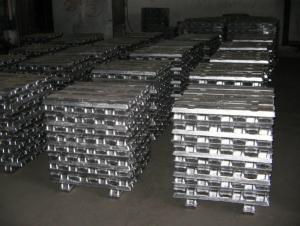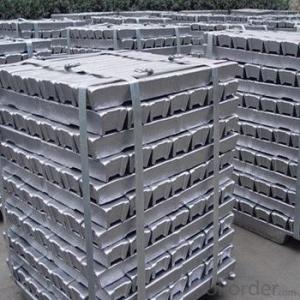Aluminum Pig/Ingot With High Purity And Different Grade
- Loading Port:
- China main port
- Payment Terms:
- TT OR LC
- Min Order Qty:
- 1000 m.t.
- Supply Capability:
- 100000 m.t./month
OKorder Service Pledge
OKorder Financial Service
You Might Also Like
Pure Aluminum Pig/Ingot Used for Industry
1.Structure of Aluminum Pig/Ingot
A material that has been cast into a shape in order to be transported and processed easier than in an unprocessed form. An ingot is typically rectangular in shape, which allows it to be stacked. Ingots are most commonly associated with metals, with ingots of gold held in the vaults of banks and brokerages being popular images.
Aluminum Ingot is with the AL as the main chemical composition.Aluminum Ingot is used for industry,such as automobile,pinning and weaving,electron broadly and so on. Aluminum Ingot has the following advantages: easy control and operation, fast melting.
2.Main Features of the Aluminum Pig/Ingot
•High Purity
•Easy control and operation
•High strength
•Fast melting
•Competitive price
•Best Service
3.Aluminum Pig/Ingot Images
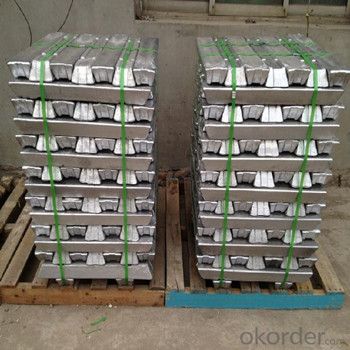
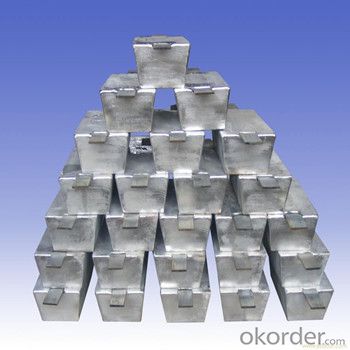
4.Aluminum Pig/Ingot Specification
Grade | Chemical Composition % | |||||||||
Al≥ | impurities ≤ | |||||||||
Si | Fe | Cu | Ga | Mg | Zn | Mn | others | Sum | ||
Al99.9 | 99.90 | 0.50 | 0.07 | 0.005 | 0.02 | 0.01 | 0.025 | - | 0.010 | 0.10 |
Al99.85 | 99.85 | 0.80 | 0.12 | 0.005 | 0.03 | 0.02 | 0.030 | - | 0.015 | 0.15 |
Al99.7 | 99.70 | 0.10 | 0.20 | 0.010 | 0.03 | 0.02 | 0.030 | - | 0.030 | 0.30 |
Al99.6 | 99.60 | 0.16 | 0.25 | 0.010 | 0.03 | 0.03 | 0.030 | - | 0.030 | 0.40 |
Al99.5 | 99.50 | 0.22 | 0.30 | 0.020 | 0.03 | 0.05 | 0.050 | - | 0.030 | 0.50 |
Al99.00 | 99.00 | 0.42 | 0.50 | 0.020 | 0.03 | 0.05 | 0.050 | - | 0.050 | 1.00 |
5.FAQ of Aluminum Pig/Ingot
We have organized several common questions for our clients,may help you sincerely:
①How about your company?
A reliable manufacturer & supplier of Aluminum Pig/Ingot,with many years’ experience in producing Aluminum Pig/Ingot.The items have beedn exported around the world,and have been acceptable among the customers,and have gotten the good reputation already.No matter from the quality,price and service,can be guaranteed for the cusgtomers.High purity and diffent grade are available.
②How to guarantee the quality of the products?
We have established the international advanced quality management system,every link from raw material to final product we have strict quality test;We resolutely put an end to unqualified products flowing into the market. At the same time, we will provide necessary follow-up service assurance.
③How long can we receive the product after purchase?
In the purchase of product within three wo We have organized several common questions for our clients,may help you sincerely:
- Q: What is the role of aluminum ingots in the production of aircraft engines?
- Aluminum ingots play a crucial role in the production of aircraft engines as they are used to manufacture various engine components. Aluminum, being lightweight and possessing excellent thermal conductivity and corrosion resistance, is an ideal material for aircraft engines. The ingots are melted and cast into different shapes to create parts such as engine casings, pistons, cylinder heads, and other structural components. These ingots provide strength and durability while helping to reduce the overall weight of the engine, resulting in improved fuel efficiency and performance of the aircraft.
- Q: How much is a ton of aluminium ingots?
- If the die cast aluminum ingots, such as ADC12, are more expensive
- Q: What are the common defects found in aluminum ingots?
- There are several common defects that can be found in aluminum ingots. One of the most common defects is porosity, which refers to the presence of small voids or air pockets within the ingot. Porosity can occur due to improper casting techniques or insufficient degassing of the molten aluminum. This defect can weaken the overall structure of the ingot and reduce its mechanical properties. Another common defect is segregation, which occurs when there is an uneven distribution of alloying elements or impurities within the ingot. This can result in variations in the composition and properties of different sections of the ingot. Segregation can be caused by improper alloying or inadequate mixing of the molten aluminum. Cracking is another defect often found in aluminum ingots. This can occur during cooling or solidification of the ingot if there is rapid or uneven cooling, leading to thermal stress and cracking. Cracking can also be caused by excessive hydrogen content in the aluminum, which can promote the formation of internal cracks. In addition, surface defects such as dross, oxide films, and inclusions can be commonly found in aluminum ingots. Dross refers to the impurities and oxides that float on the surface of the molten aluminum, which can become trapped in the ingot during solidification. Oxide films can form on the surface of the ingot due to exposure to air or inadequate protection during casting. Inclusions, on the other hand, are foreign particles or non-metallic compounds that are trapped within the ingot during solidification. These defects can have a significant impact on the quality and performance of aluminum ingots. Therefore, it is crucial to employ proper casting techniques, control alloy composition, ensure adequate degassing, and implement effective quality control measures to minimize the occurrence of these defects.
- Q: How are aluminum ingots protected from corrosion?
- Aluminum ingots are protected from corrosion through various methods such as applying a protective coating, using proper storage conditions, and employing corrosion inhibitors.
- Q: What are the advantages of using recycled aluminum ingots?
- There are several advantages of using recycled aluminum ingots. Firstly, recycling aluminum saves energy as it requires significantly less energy to produce recycled aluminum compared to virgin aluminum. This helps in reducing greenhouse gas emissions and mitigating climate change. Secondly, using recycled aluminum ingots reduces the need for mining and extraction of bauxite, the primary raw material for aluminum production, thereby conserving natural resources. Additionally, recycling aluminum helps in reducing landfill waste and promotes a circular economy by reusing materials instead of disposing them. Lastly, recycled aluminum ingots exhibit the same quality and performance as virgin aluminum, making them a sustainable and cost-effective alternative for various industries.
- Q: How do aluminum ingots contribute to the overall aluminum industry?
- The overall aluminum industry heavily relies on aluminum ingots, which serve as the primary raw material for producing various aluminum products. To create ingots, aluminum ore is smelted and the resulting molten metal is poured into molds to solidify. Aluminum ingots offer great versatility as they can be further processed and shaped into different forms like sheets, plates, rods, tubes, and extrusions. These forms find applications in various industries, including automotive, aerospace, construction, packaging, electrical, and consumer goods sectors. Additionally, aluminum ingots provide several advantages that contribute to the growth and sustainability of the aluminum industry. Aluminum is lightweight, corrosion-resistant, and possesses excellent conductivity, making it an ideal choice for numerous applications. Its low density enables energy efficiency in transportation, reducing fuel consumption and emissions in the automotive and aviation sectors. Moreover, aluminum's corrosion resistance ensures longer-lasting products, reducing maintenance and replacement costs. The availability and affordability of aluminum ingots also play a significant role in the aluminum industry. Aluminum is the third most abundant element on Earth's crust and can be easily extracted from bauxite ore. This accessibility, combined with efficient production processes, makes aluminum ingots readily available for manufacturers at competitive prices, stimulating demand and market growth. Furthermore, the recycling potential of aluminum ingots contributes to the industry's sustainability. Aluminum is infinitely recyclable, meaning it can be melted and reused without any loss in quality. Recycling aluminum requires only a fraction of the energy compared to primary production, resulting in significant energy savings and reduced environmental impact. The use of recycled aluminum ingots helps conserve natural resources, reduce waste, and lower carbon emissions. In conclusion, aluminum ingots are indispensable to the overall aluminum industry as they provide the raw material for manufacturing a wide range of aluminum products. Their versatility, lightweight nature, corrosion resistance, and recyclability make them highly valuable for multiple industries. The availability and affordability of aluminum ingots further contribute to the industry's growth and sustainability, while their recycling potential helps conserve resources and reduce environmental impact.
- Q: 102 non-standard aluminum ingot is like? And ordinary non-standard aluminum ingot what is the difference?
- 102 refers to ZLD102 bar, since there are grades, that is, GB aluminum ingots. Non-standard 102 may also refer to the main elements in the scope of the impurities exceeded the standard aluminum ingot, non-standard name.
- Q: How can aluminum cans be made into aluminium ingots?
- First combustion in pure oxygen to produce three aluminum oxide two, and then three oxidation of two aluminum and iron combustion in the air replacement, the formation of iron oxide substances and aluminum elements, which is the required - aluminum ingot
- Q: What are the scouring agents in the die casting process, such as slag remover, coating agent, flux, and what matters should be paid attention to when the aluminium ingot is dissolved?,
- scouring agentFor refining alloy liquid, the main purpose is to remove the gas inside the liquid metal liquid, raise the density of the aluminum liquid die-casting
- Q: How are aluminum ingots used in the packaging industry?
- Due to their unique properties and versatility, aluminum ingots play a crucial role in the packaging industry. Various types of aluminum packaging materials, such as cans, foils, containers, and lids, are primarily manufactured using these ingots. Aluminum cans are one of the primary uses of aluminum ingots in the packaging industry. They are widely preferred for packaging beverages like soft drinks, beer, and energy drinks. The lightweight nature of aluminum cans makes them easy to transport and stack, making them more preferable than other materials. Moreover, aluminum cans provide excellent protection against light, oxygen, and moisture, ensuring the freshness and quality of the packaged product. Aluminum foils are another common application of aluminum ingots in the packaging industry. They are used for wrapping food items like chocolates, snacks, and pre-cooked meals. Aluminum foils are also used for sealing bottles and containers. The remarkable barrier properties of aluminum foils prevent the entry of air, moisture, and contaminants, preserving the taste, texture, and overall quality of the packaged food. Aluminum ingots are also utilized in manufacturing aluminum containers, which are commonly known as trays or pans. These containers are extensively used for packaging ready-to-eat meals and takeout food. With their lightweight, durable, and high-temperature resistance properties, aluminum containers are suitable for both cooking and reheating. Furthermore, aluminum ingots are employed in the production of aluminum lids and closures used in the packaging industry. These lids are designed to fit tightly on various packaging materials, ensuring the safety and integrity of the packaged products. Aluminum lids provide an effective seal, preventing leakage, contamination, and tampering. In conclusion, the packaging industry widely utilizes aluminum ingots due to their excellent properties like corrosion resistance, lightweight, and malleability. By using aluminum ingots, the packaging industry can produce sustainable, durable, and high-quality packaging materials that meet the demands of modern consumers.
Send your message to us
Aluminum Pig/Ingot With High Purity And Different Grade
- Loading Port:
- China main port
- Payment Terms:
- TT OR LC
- Min Order Qty:
- 1000 m.t.
- Supply Capability:
- 100000 m.t./month
OKorder Service Pledge
OKorder Financial Service
Similar products
Hot products
Hot Searches
Related keywords
